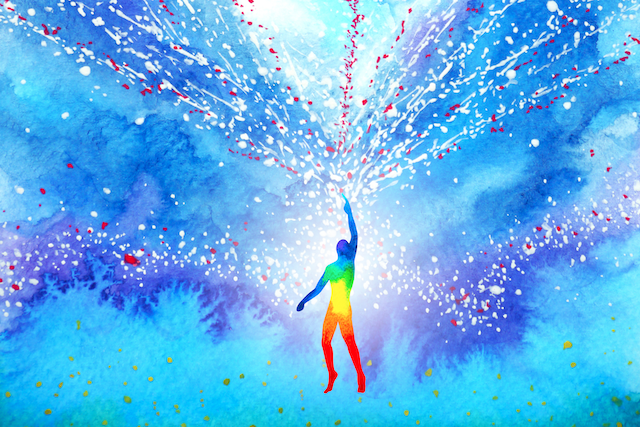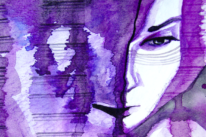
“Forgiveness has nothing to do with absolving a criminal of his crime. It has everything to do with relieving oneself of the burden of being a victim.” ~C.R. Strahan
It’s not fair, is it?
Getting hurt. All over again.
It wasn’t so bad forgiving them the first time. You rose to the occasion. You became the bigger person. You tried to move on.
You thought you had to. After all, they did ask nicely.
You just knew you’d be BFFs again and go right back to, “Let’s go for Jamba Juice!”
But it didn’t go down like that, did it?
No BFFs. No Jamba Juice. Not even a check-in text.
You put it all on the line and forgave them. Now they’ve let you down again, and you can’t help but think it was the biggest mistake you ever made. And on top of it all, you can’t stop wondering why it all happened to you.
I used to wonder that too.
When I was fourteen, my mom sent me away. She thought it would be nice if there were a nun in the family. And I was going to be it.
I had never been further than my Mamaw’s house. I had just shaved my legs for the first time and gotten my room back after the toddlers moved into the new add-on.
Now, I’d be sharing a room with three other postulants over 1,100 miles away—sleeping on used hospital beds. In silence. For six years.
My life, as I knew it, had ended.
I wasn’t allowed to spend holidays at home. I never got another birthday present. And for six years, all I wore was a homemade blue habit with a plastic collar I had to scrub with a toothbrush.
But then I got out. And my life ended all over again.
Where do you fit when you don’t fit anywhere? I didn’t know anyone. No one knew me. My little brothers and sisters were all teenagers by then. My dad had married the woman he’d had an affair with. And to top it all off, my mom wouldn’t let me come home.
I just wanted to move on. I thought forgiving everyone would make it okay. Forgive my family for giving me away. Forgive the nuns for going all American Horror Story on me. Forgive the Catholic church for expecting me to make up something to say in confession every week. Forgive my parakeet for dying while I was gone.
The more I told myself to stop being angry, the angrier I got. The more I tried to let it go, the more it haunted me at every turn.
After six years, I should have been an expert at forgiveness. But in reality, I was as clueless as a homeless kid trapped in a grown-up twilight zone.
In the end, forgiveness actually became my ultimate game-changer. But only after I saw through the lies people led me to believe.
Can You Trust Everything You Believe About Forgiveness?
There’s a whole lot of noise out there about forgiveness. And you know what noise does? It chats up your Inner Victim and distracts you. The louder the noise gets, the quicker you need to call in your Inner Skeptic. Because some of the noise is nothing but big, fat lies.
Lying to yourself while you forgive someone is worse than not forgiving them at all.
If you want to open your heart to freedom, you must open your eyes about forgiveness. Here are some crippling myths about forgiving that leave you victimized and the truths that will set you free.
Lie: When I forgive, I have to forget what happened and move on.
Truth: Remembering how you got hurt empowers you to forgive and create the life you deserve.
When I got home, I tried to forgive my mom for making me grow up isolated and alone. I thought I had to forget that I’d never been allowed to talk to a guy who wasn’t a relative.
The one awkward time I got asked to dance at a happy hour, I freaked out and started picking an imaginary bug out of my drink. Right then, I wanted nothing more than to crawl into that cup and float around with the ice cubes.
Acting like the convent never happened was like walking through a minefield with my eyes shut and a great big target on my back. When you forget, you don’t know how to navigate. When you can’t navigate, you fake it.
Faking it is not forgiveness. Faking it does not set you free and keep you safe.
That’s why it’s important to remember. Remembering what happened gives you a compass for where you want to be. It lets you go easy on yourself while you design how it’s going to be from now on.
Remembering how I was kept isolated told me that I didn’t deserve to be lonely any longer. Once I knew I could surround myself with loving relationships in my life, I was open to forgiving my mom.
Honoring your reality lets you build the life you deserve and empowers you to forgive.
Lie: Forgiveness wipes the slate clean and gives them another chance to hurt me.
Truth: Forgiveness doesn’t invite you to get hurt again. Forgiveness empowers you to teach others how to treat you differently.
Forgiving someone takes a lot of honesty. Honesty about yourself and how you deserve to be treated, and honesty about the one who hurt you and how they’re inclined to act around you.
You don’t cause the way someone else acts, but you can invite them to act differently with you. If they don’t want to play nice, you get to change the way you show up around them.
When my brother texted me that they all changed their minds about picking me up at the airport, I got frantic. It was Christmas. Mom’s house was an hour away. And all the rental cars were taken.
When you trust people to be exactly who they are, you can adjust your expectations of them accordingly.
I told my family that I wanted control over my travel arrangements and would get my own room and join them for dinner.
The long drive gave me time to think and see them honestly after they let me down. Right then, I decided that I wouldn’t rely on unreliable people any longer. Suddenly, I wasn’t expecting them to rescue me. And I was able to forgive them.
Forgiveness lets you see your offender honestly and puts you in charge of how you’re treated.
Lie: I have to forgive someone or they won’t heal and be forgiven.
Truth: When someone asks for forgiveness, they want their own peace back. And that’s not even something you can give them.
One of the biggest truths I learned is that forgiveness heals me. I can’t do someone else’s healing for them.
The only time my mother ever asked me to forgive her was late at night, in the privacy of her own living room, at the bottom of a bottle of Sandeman’s Port.
“Will you forgive me? For everything?”
“Sure. Yeah. Of course,” I’d say. But next year would only find her crying at the bottom of another bottle. I wanted her to be happy. But I couldn’t go there for her.
Setting people free to walk through their own darkness is the truest test of your own freedom.
Lie: I can’t forgive someone who doesn’t deserve to be forgiven.
Truth: Forgiveness doesn’t give others what they deserve. Forgiveness gives you the only chance of ever getting what you truly deserve—your freedom.
Freedom means you let go of hurting and decide to take the good stuff for a change.
Letting yourself feel better takes a lot of trust. Trust that there’s enough good stuff out there for you. Trust that even if the bad guy gets some, there’s still always plenty for you.
My early phone chats with Mom always ended badly. She’d start in with, “Remember when you guys used to—” And I’d cut in that, “No, Mom. I don’t remember. I never lived in that house. I was in a convent.” As soon as she’d come back with, “Well, I hope you don’t think that was my idea!” the F-bombs would hit the fan.
I thought I never could forgive her if she wouldn’t admit all that happened to me. Truth is, I don’t think she’ll ever understand all that happened to me. And eventually, it didn’t matter. I stopped waiting for her to deserve it and just gave myself the good stuff anyway.
Forgiveness isn’t about balancing the scales of justice. Forgiveness is about attaining your own freedom along the way.
Lie: I can’t forgive until I know the reason this happened to me.
Truth: You may never know the reason anything happened. But you can create your own reason for everything that happens now.
What happened to you wasn’t fair. But “why?” is a question you could be chasing to your grave.
Why torture yourself trying to make sense of what didn’t make sense? You already suffered through what actually happened to you. Why keep feeding the story with endless possibilities of terrible endings?
I wasted a lot of time wondering why. I wanted it all to somehow make sense. If it wasn’t my fault, it had to be somebody else’s. Because what’s more pointless than thinking that I sacrificed my entire youth for absolutely no reason at all?
Finally, I gave myself my own reason. I needed a reason to live now.
If I was going to live, I was going to love living.
The day I gave myself a reason to live was the day I stopped looking for the reason my youth had died.
That was the day that I became free.
Freeing yourself from the burden of “why?” sets you free from an eternal blame game with no end in sight.
How to Break Free Once and for All
Can I get real with you for a second?
We’ve all got an inner victim. Our own personal champion of lies and no way out. And it needs us to believe it.
Here’s the thing—lies get bigger when you believe them. But so does the truth.
Stop pointing fingers at the lies you’ve been led to believe.
You are not a victim. You are strong. And free. And powerful in your truth.
There’s not a thing standing in your way.
Set yourself free already! Take the good stuff for a change.
About Anne Bechard
Anne Bechard is a firm believer that you can totally follow your passion and keep your day job. She's got a secret super power to turn dream-chasers into prosperous bloggers. Join her community and pick up your free copy of her Winning Tips That Make You a Profitable Blogger.













 Though I run this site, it is not mine. It's ours. It's not about me. It's about us. Your stories and your wisdom are just as meaningful as mine.
Though I run this site, it is not mine. It's ours. It's not about me. It's about us. Your stories and your wisdom are just as meaningful as mine. 